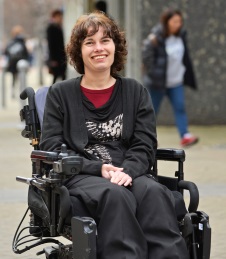
Becoming a dietitian has always been a passion for Angie Anderson although fulfilling that dream had its challenges.
At high school she was pointed towards clerical and office work - which she did for a number of years - but she missed out the core science subjects she needed to follow her passion.
After advice from DI&S, Angie went to Foundation Studies at the Otago Polytech where she spent a year studying chemistry and other science subjects. Angie then completed a bridging chemistry course at Summer School.
Although she was studying part-time she completed her BSc in Human Nutrition in five years and her postgraduate studies in dietetics (PGDipDiet) over two years.
One of the biggest challenges was the lab work and the kitchen practicals where DI&S was able to arrange for help.
"With my disability I have limited arm strength and fatigue was bit of a problem, so I needed helpers. They were basically my hands and did all the physical work for me while I instructed them on what I needed done."
Angie says the Department of Human Nutrition was always accommodating. "They often had the problems solved before I even approached them about it."
Once she had completed her qualifications Angie started looking for a job through Workbridge, although in the end she found her own employment. Two part-time rest home jobs provided around eight hours work per week, and this year Angie has also started working 15 hours a week as a research dietitian working on a weight-loss maintenance study.
Looking back, one of her personal keys to success was learning to pace herself and being prepared to accept help.
"When I first came to the University I really wanted to do things alone, so I could say I had achieved all this by myself. But it was really recognising that people like the disability office are there to help you be as independent as possible and you are no less of a person for accepting that help. It really is a means to an end to make that dream possible."